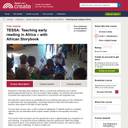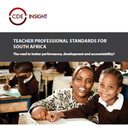
Groundbreaking study of a grade 1 reading intervention in a high poverty school over a four year period that found that improvements in reading in the African languages are dependent on changes in instructional practices in classrooms.

Groundbreaking study of a grade 1 reading intervention in a high poverty school over a four year period that found that improvements in reading in the African languages are dependent on changes in instructional practices in classrooms.
A major study conducted in the late 1980s into the nature of the language and learning difficulties experienced by Grade Five learners when the medium of instruction changed from mother tongue to English.

This research study sought to examine the results of three interventions to improve teachers’ instructional practice – one with block training twice a year (which included provision of scripted lesson plans, materials and training), another with the same block training and ongoing support from a reading coach, and a third involving parents. The intervention with reading coaches was found to be a critical component in the persistence of gains.
The ITERP project – a collaboration between the Department of Higher Education and Training (DHET), the Department of Basic Education (DBE), the Education Deans' Forum, and JET Education Services – was to gather up-to-date information on the state of initial teacher education (ITE) in South Africa and to examine the extent to which the ITE programmes offered by universities are adequately preparing teachers to teach in South African schools.
Zenex Foundation materials designed by SAIDE and Woz’obona on Fundamentals for Communications at NQF Level One, in English. It uses a problem centred approach. The materials were originally designed for ECD practitioners studying at NQF Level 1 (meeting the requirements of five NQF level 1 unit standards to gain a qualification in Communications (Unit Standards 12462, 119641, 119631, 12469, and 119636) to gain a part qualification in Early Child Development at NQF Level 1). The course comprises learner and trainer materials.

Opinion piece by the Director of the Molteno Institute for Language and Literacy on why switching to second-language teaching too early places pupils at a great disadvantage.

A comparative analysis of National Senior Certificate marks and National Benchmark Test (NBT) Academic Literacy (AL) test results for a cohort of first-year education students at the University of the Witwatersrand, which showed that the same mark in English HL and FAL does not necessarily reflect the same level of English language academic competence as measured by the NBT AL test. On average, students who wrote the FAL papers scored between .5 and .9 of a standard deviation below students who wrote the HL paper (and probably need extensive and ongoing academic support).


A useful guide to what topics “literacy experts” (mainly teachers and reading/literacy specialists in the United States, Canada, Phillippines, Australia and Nigeria) are currently most interested in and what they consider most important.

Responding to evidence from PIRLS 2011 and Reading Recovery monitoring data that New Zealand’s 1999 National Literacy Strategy had failed, the authors look at the factors causing the failure (a constructivist orientation towards literacy education with a lack of attention to phonemic awareness and alphabetic coding skills, lack of response to differences in literate cultural capital, and policies on the first year of literacy teaching resistant to providing explicit instruction and assessment) and review more effective strategies based on contemporary theory and research.

Investigating the Comprehension Iceberg: Developing empirical benchmarks for early grade reading in agglutinating African languages

Provides provides guidance for those developing programmes and working with babies, toddlers and young children from birth to age four.

Produced by Teacher Education in Sub-Saharan Africa (TESSA) on the Open University's OpenLearn platform, this free introductory course supports an active teaching approach. The course material can be studied online or downloaded.

The Core Academic Language Skills Instrument (CALS-I) was designed by the Institute of Education Sciences of the United States Department of Education to measure high utility academic language skills hypothesized to support reading comprehension across the content areas in grades 4 through 8.

The CSTL Handbook is a simpler adaptation of the National Support Pack, and is intended to guide and strengthen the implementation of the Care and Support for Teaching and Learning (CSTL) programme in schools, by providing information on the policies and principles underpinning the CSTL programme, as well as guidance on implementing the ten defined Priority Action Areas at school level.

Study of what the orthography of isiZulu requires of readers. As an agglutinative language with a conjoined writing system, isiZulu carries meaning not only in separate words, but also in morphemes that cluster together, forming long complex words. Eye tracking data shows that competent adult readers of isiZulu move their eyes across text in saccades (shifts of the point of focus) that are short in comparison with the saccades of efficient reading of English. It also shows that readers of isiZulu fixate on points of text for longer periods than do readers of English. The key argument of the paper is that the orthography of isiZulu has features that require attention by teachers of reading if their learners are to benefit from the advantages that reading in their first language should bring.


"Quality education requires well-trained teachers"

Description of an intervention programme designed to support the transition to English as the medium of instruction in Grade 4 in a township school, using a pre- and post-test design. Because the pre-tests revealed very poor literacy levels in both Zulu home language and English, the intervention programme was modified in an attempt to fast-track the learners to literacy levels more appropriate to their grade. The paper briefly considers some of the reasons for the initial poor literacy performance and provides a model for literacy development in high-poverty contexts in order to minimise the need to play catch-up in the Intermediate Phase.

A description and appraisal of a reading comprehension programme that was aimed at Grade 6 learners and teachers and implemented in different ways in two high-poverty primary schools where reading levels were very low. The results of the comprehension programme for the learners' reading abilities in their home language, Northern Sotho, and in English are reported and lessons learned identified.

Conference presentation on Oral Reading Fluency and its correlation with comprehension among EFAL learners in South Africa

These draft standards were prepared by members of the Consolidated Literacy Working Group of the Primary Teacher Education Project (PrimTEd). These have been discussed within the group, examined at a national consultation, and revised accordingly. They are now open for a further consultation and it must be emphasized that they are draft standards, standards are only truly such when they are recognized by the appropriate authority or authorities. They are standards that apply specifically to initial language and literacy teacher education with a specific focus on: • Developing new graduate teachers’ ability to teach literacy in African languages as home or additional languages, with a special focus on reading and writing; • English as a First Additional language with a special focus on reading and writing; and on using English as the medium of instruction across the curriculum • Developing new graduate teachers’ ability to teach literacy in English as a home or first additional language in multilingual contexts.
Since 2011 the Department of Education has produced free Mathematics workbooks for all primary education schools. These can be downloaded from the DBE website.
Revised for 2016 but never published.
Revised for 2016 but never published
Revised for 2016 but never published
Revised for 2016 but never published
Partially revised for 2016 with annotations indicating required changes.
Revised for 2016 but never published
Revised for 2016 but never published
Prepared in 2015 but never published
Prepared in 2015 but never published

Since 2011 the Department of Education produced free Literacy workbooks in all the home languages for all primary education school grades R to 6.

CITE-TEL is a web-based resource, the Critical, Interactive, Transparent & Evolving literature review in Initial Teacher Education in Literacy, hosted by the University of Texas at Austin. It seeks to list the research literature that is focused on initial teacher preparation in literacy and provides a forum for researchers, practitioners, and policy makers to engage with this growing body of research.

Provides a detailed outline of a potential Foundation Phase teacher training course on how to teach reading. After providing some information on the state of reading in South Africa and the need for the proposed course, the Concept Note outlines (1) what such a course should entail as far as content is concerned, (2) how the course should be structured, delivered (modality) and assessed, (3) how it could be accredited, and (4) how it should be evaluated.

Final Report to the ZENEX Foundation on poor student performance in Foundation Phase literacy and numeracy which includes policy recommendations

Co-authored by Borhene Chakroun, Chief of Section of Youth, Literacy and Skills Development at UNESCO and James Keevy, CEO at JET Education Services.
The Regional Local Economic Development Initiative (RLEDI) of the Graduate School of Business and Leadership (GSB&L) at the University of KwaZulu-Natal, in collaboration with the Education KwaZulu-Natal Economic Development, Tourism and Environmental Affairs (KZN EDTEA), invites submission for Volume 9 of Skills@Work: Theory and Practice.
An Association for NPOs in Education

"The Investors in People Awards recognises the people and teams that make the difference every day highlighting excellence from across the Investors in People global community".

Focus on school food gardens

Growing our future through education in agriculture and nutrition; Improving school food gardens; Supporting food security through inquiry-based learning; Development through (em)power(ed) relationships.

Report based on two research papers written by Nick Taylor, Natasha Robinson and Jane Hofmeyr for JET Education Services.